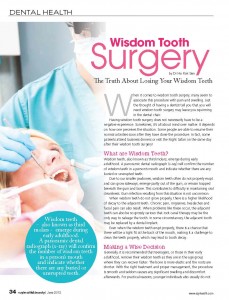 When it comes to wisdom tooth surgery, many seem to associate this procedure with pain and swelling. Just the thought of having a dentist tell you that you will need wisdom tooth surgery may leave you squirming in the dental chair.
When it comes to wisdom tooth surgery, many seem to associate this procedure with pain and swelling. Just the thought of having a dentist tell you that you will need wisdom tooth surgery may leave you squirming in the dental chair.
Having wisdom tooth surgery does not necessarily have to be a negative experience. Sometimes, it’s all about mind over matter. It depends on how one perceives the situation. Some people are able to resume their normal activities soon after they have done the procedure. In fact, some patients attend business dinners or visit the Night Safari on the same day after their wisdom tooth surgery.
What are Wisdom Teeth?
Wisdom teeth, also known as third molars, emerge during early adulthood. A panaromic dental radiograph (x-ray) will confirm the number of wisdom teeth in a person’s mouth and indicate whether there are any buried or unerupted teeth.
Due to our smaller jawbones, wisdom teeth often do not properly erupt and can grow sideways, emerge partly out of the gum, or remain trapped beneath the gum and bone. This contributes to difficulty in maintaining oral cleanliness. Gum infection resulting from this situation is not uncommon.
When wisdom teeth do not grow properly, there is a higher likelihood of decay to the adjacent teeth. Chronic pain, migraines, headaches and facial pain can also result. When problems like these occur, the adjacent teeth can also be so grossly carious that root canal therapy may be the only way to salvage the tooth. In some circumstances, the adjacent tooth may be replaced by a dental implant.
Even when the wisdom teeth erupt properly, there is a chance that there will be a tight fit at the back of the mouth, making it a challenge to clean the teeth properly, which may lead to tooth decay.
Making a Wise Decision
Generally, it is recommended that teenagers, or those in their early adulthood, remove their wisdom teeth as they are in the age group where they can recover faster. The bone is more elastic and the roots are shorter. With the right treatment and proper management, the procedure is smooth and seldom causes any significant swelling and discomfort afterwards. For practical reasons, younger individuals also usually do not have too many commitments. Thus arranging their schedules will be easier than in the case of a working adult with a family.
Researchers have also found that older patients aged 30 years and above may be at greater risk for gum disease in the tissues surrounding the wisdom teeth if left untreated.
For those worried about the loss of wisdom teeth affecting their eating, there is no tissue – losing your wisdom teeth will not affect your chewing ability.
Surgical Options
There are a few options should you decide to proceed with wisdom tooth surgery:
Local Anaesthesia
The surgery can be done under local anaesthesia, which is how most minor oral surgery is performed. The patient is conscious throughout the procedure but feels no pain as the affected part is numb of sensation.
Sedation
With sedation, oral surgery is performed while the patient is in a light sleep. The patient is in a completely relaxed state of mind, and this helps to significantly reduce any anxiety. Sedation can be done in the clinic with the assistance of an anaesthetist who will administer the sedation and monitor the patient’s vital parameters throughout the surgery.
General Anaesthesia
General anaesthesia usually takes place in a hospital or day surgery centre which will increase the cost of treatment. Patients are in a deeper state of sleep, and recovery from anaesthesia will be a little slower than with sedation.
Rest assured that no matter which procedure is selected for your surgery it will be done with utmost care and attention that ensures you will be safe and comfortable during and after the procedure.
Financial Considerations
Patients who are Singaporeans or Permanent Residents of Singapore may be able to claim a portion of their surgical expenses from their Medisave Account. The amount covered by Medisave will vary. The exact claim amount of wisdom teeth surgery would depend on the complexity of the procedure.





